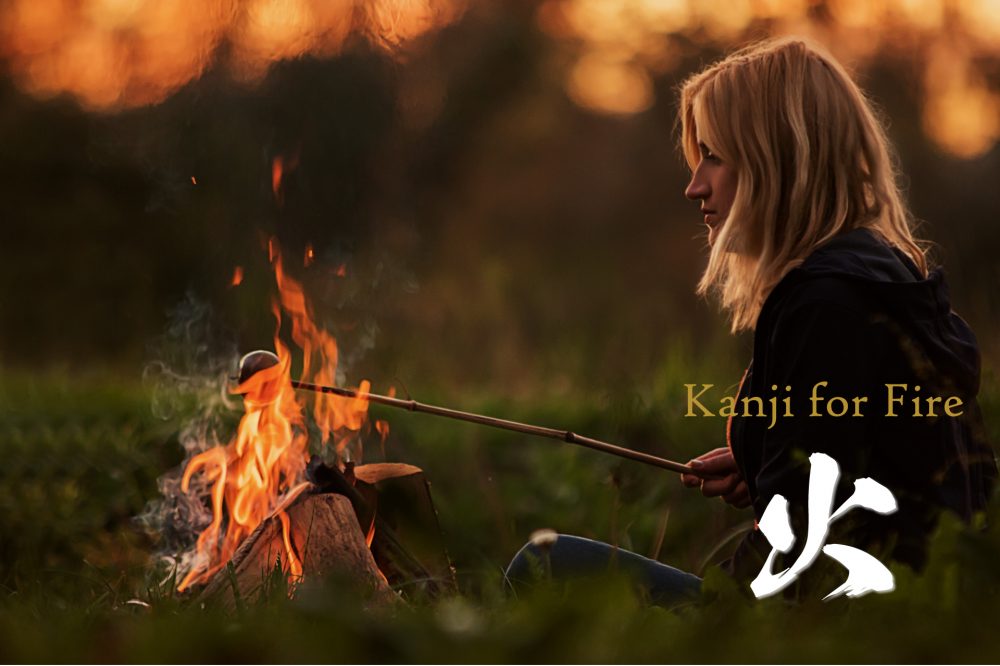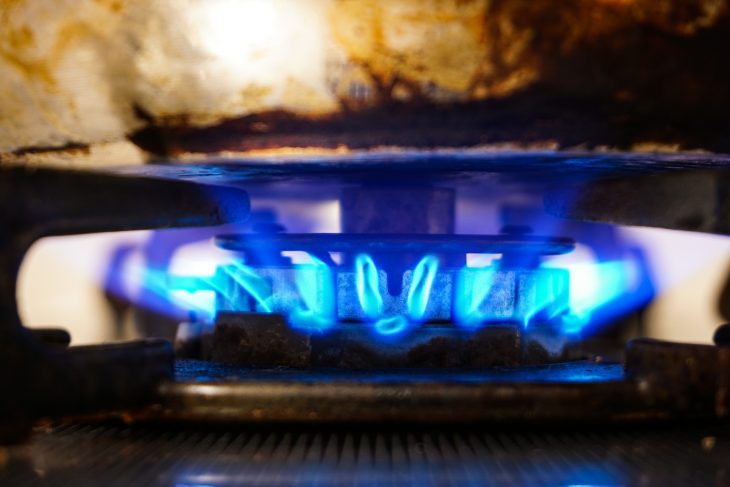Share this link via
Or copy link
One of the best Japanese Kanji dictionary.

Kanji for fire is 「火」. It is a simple word, but therefore, there are many Kanji compounds, proverbs, and idioms. Let’s see how the Kanji is used in Japanese.
Contents

火 is a pictogram of a flame. The 甲骨文字 looks like a flame for sure.
When the Kanji is used alone, it will merely mean “fire.” But in a particular context or when compounded with other Kanji characters, different meanings will appear.
There are two Kanji characters for “flame.” One is 炎, and another is 焰. Both are pronounced “honō”  in Kunyomi and “en” in Onyomi. 炎 is more common today.
in Kunyomi and “en” in Onyomi. 炎 is more common today.
焰 could also be written as 焔. If you look at a Kanji dictionary, it says that “焔” is a 俗字(zokuji)  of “焰.” 俗字 means that the character is not a standard, but it is a shape that people have been used. However, if you try to type 焰 with your computer or smartphone, they suggest 焔 as a first choice. This occurs because the industrial standard registered 焔 for the Kanji. Both shapes are accepted in society, so don’t be too nervous.
of “焰.” 俗字 means that the character is not a standard, but it is a shape that people have been used. However, if you try to type 焰 with your computer or smartphone, they suggest 焔 as a first choice. This occurs because the industrial standard registered 焔 for the Kanji. Both shapes are accepted in society, so don’t be too nervous.
Here are some Kanji compounds using 火.
 : Fire (uncontrolled flames, light, and heat that destroy things such as houses or buildings)
: Fire (uncontrolled flames, light, and heat that destroy things such as houses or buildings) : Arson
: Arson : Fireworks. 花 means flower. It sure looks like a flower made of fire!
: Fireworks. 花 means flower. It sure looks like a flower made of fire! : Spark
: Spark : Volcano
: Volcano : A volcanic eruption
: A volcanic eruption : Light of fireflies
: Light of fireflies : Mars
: Mars : Tuesday
: Tuesday : Urgent.
: Urgent. means he is out on urgent business. Probably the most frequent situation you encounter when doing business is when Japanese people are asking to do something with a very short deadline.
means he is out on urgent business. Probably the most frequent situation you encounter when doing business is when Japanese people are asking to do something with a very short deadline. means “I’m sorry to give you such an urgent request, but your response within today is appreciated.”
means “I’m sorry to give you such an urgent request, but your response within today is appreciated.”
Gas stove
Most of the Japanese use gas stoves for cooking. There are some houses with IH stove but are still a minority.
If you want to say “heat the ingredients thoroughly,” you should say「火を通す」(hi o tōsu)  .
.
「火にかける」(hi ni kakeru)  means to put something like a pot or a frying pan on fire to cook.
means to put something like a pot or a frying pan on fire to cook.
「火加減」(hikagen)  is for the “heat level.” 「加減」(kagen)
is for the “heat level.” 「加減」(kagen)  means adjustment.
means adjustment.
強火(tsuyobi)  is for high heat, 中火(chūbi)
is for high heat, 中火(chūbi)  is for medium heat, and 弱火(yowabi)
is for medium heat, and 弱火(yowabi)  is for low heat. とろ火(torobi)
is for low heat. とろ火(torobi)  is lower than 弱火. You must try to adjust the heat as low as you can.
is lower than 弱火. You must try to adjust the heat as low as you can.
If you want to see a picture of the difference in the heat level, here is a good website that could be used as a dictionary for cooking. It also has various recipes for home cooking.
On this page, you can understand the terms of heat with photos.



 that means something lit a fire in you in terms of motivation.
that means something lit a fire in you in terms of motivation.
 means the fire begun from the kitchen(台所).
means the fire begun from the kitchen(台所). , it says that when you hit your head or forehead strongly, it hurts so much that you feel like sparks are coming out from your eyes.
, it says that when you hit your head or forehead strongly, it hurts so much that you feel like sparks are coming out from your eyes.



 .
.These are the usage of 火 in Japanese.
The meanings of the word “fire” differ between English and Japanese. In English, “fire” could mean “the shooting of guns or other weapons,” or “to cause a weapon to shoot bullets, arrows, missiles.” There are words for these kind of things in Japanese, such as 「発砲する(happōsuru  , to shoot a gun)」,「矢を射る(ya o iru
, to shoot a gun)」,「矢を射る(ya o iru  , to shoot arrows)」, and 「ミサイルを発射する(misairu o hassha suru
, to shoot arrows)」, and 「ミサイルを発射する(misairu o hassha suru  , to fire a missile)」. These words don’t include 火.
, to fire a missile)」. These words don’t include 火.
Probably that is because Japan is a country with strict gun control. No one could possess guns except police officers and self-defense officials. The only way that ordinary people could own guns is to get a license for hunting and get registered by the governor of the prefecture. Therefore, Japanese people are not familiar with firearms.
Interestingly, the difference in the image or impression of the word “fire” seems to reflect the values and societies of English-speaking countries and Japan.
I hope this article helps you to understand the difference between the two cultures.
What is Onyomi?
Onyomi, also known as the "Sino-Japanese reading," is one of the two main reading systems for kanji characters in Japanese. It refers to the reading of a kanji character that is derived from the original Chinese pronunciation.
What is Kunyomi?
Kunyomi, also known as the "native Japanese reading," is one of the two main reading systems for kanji characters in Japanese. It refers to the reading of a kanji character that is based on the native Japanese pronunciation. Kunyomi readings are often used when a kanji character stands alone or is followed by hiragana, as in verbs and adjectives. Mastering both kunyomi and onyomi is crucial for understanding and using kanji effectively in the Japanese language.
What is Radical?
A radical, also known as "bushu" in Japanese, is a fundamental component of kanji characters. Radicals are the building blocks of kanji and are used to categorize and organize them in dictionaries. There are 214 traditional radicals, each with its own meaning, which often provides a clue to the meaning of the kanji character it forms.
What is strokes?
Stroke count, or "kakusuu" in Japanese, refers to the number of individual brushstrokes required to write a kanji character. Each kanji has a specific stroke order and stroke count, which are essential for writing the character correctly and legibly. Understanding and following the correct stroke order not only ensures proper balance and aesthetics but also makes writing more efficient and fluid.